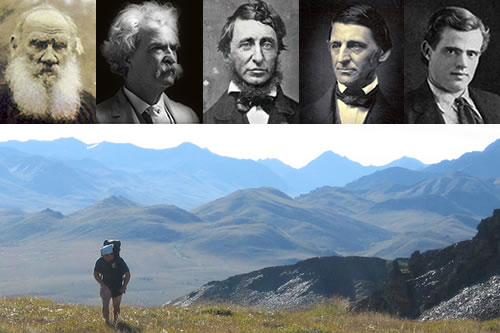
Driving questions:
- Who determines right and wrong for the individual?
- What is the individual’s obligation to society?
- Why might it be necessary to step out of social convention?
- How much of one’s values must one compromise to live in society?
- What is the nature of humankind?
| Encyclopedias | |||||||
| Research Databases | |||||||
1. Search the school library for a book that refers to one of the following:
- Essay writing
- Literary criticism
- Literary terms
- Allusions
- Authors’ biographies
- One of the “big ideas” addressed in Krakauer’s Into the Wild
- One of the artistic and/or philosophical movements that informed the book you are studying and/or its author or a related author
a) Write a citation in MLA format for that book.
b) Use the index and/or table of contents to find a relevant quote of no less than 10 words. Transcribe the quote.
c) Record the page number and the call number of the book.
Remember number 10 on the Top Ten Research Skills: “Help is available and it’s OK to ask someone, even a librarian, for guidance. The only “stupid question” is the one that never gets asked.”
2. Find an awesome quote from your T-chart for your driving question and type it up. Copy and paste it so you now have two copies of this awesome quote. For the second quote create a source citation to accompany it. Record this citation below the quote.
To demonstrate the importance of keeping careful track of your sources share with your group why your quote is meaningful as it pertains to your driving question. Once you’re done explaining this crumple up your quote and toss it in to the recycling bin. Then share with your group the same quote with your citation. Rip the paper so the 2 sections, quote and citation, are separated. Toss out the quote and explain how we can now use the citation to locate the quote.
3. Go to the Research Toolkit page under the Library & Resources menu. Find Biographies In Context and search for one of the authors from your t-chart work. Become familiar with the various forms of media this database offers. Share with your group the search results you discover.
4. Use Google to search the phrase “Was Christopher McCandless an idiot?” Evaluate the results found on the first two pages. Discuss the validity of these results: i.e. what are the sources of information on the pages you see linked in the results? Now search the same question in EBSCOHost Research Databases (available on the Research Toolkit page) and discuss the validity of these results. Compare and contrast the results available from the two searches.
5. Review three of the websites listed on the Evaluating Information page under the Library & Resources menu. Using the recommended strategies at the top of the page critically appraise these sites as sources of information. If you are uncertain whether or not one or more of these websites. If you are unsure what makes a site a valid source of information please refer to one or more of the guides to evaluating information on the Evaluating Information page.
6. Define “scholarly”, “peer reviewed”, “primary” and “secondary” as they relate to sources of information. Explain when they are appropriate to use.
7. Define plagiarism. Go to the Cite it Right page and read the definition of “plagiarism” at the top of the page. Discuss any instances of plagiarism you have been involved with, heard or read about with your group. Also discuss why you feel it is important to avoid plagiarism.

